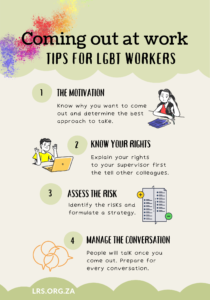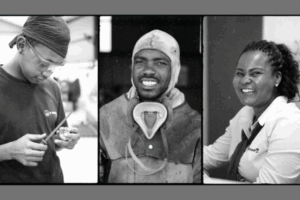Coming out at work can be daunting and risky for many LGBT workers. Know how to come out in a way that is right and safe for you.
‘Coming out’ is the process of recognising and acknowledging one’s sexual orientation or gender identity, and the decision to be open about it with oneself and with others. Coming out should be a personal choice. Do not feel pressured or intimidated into discussing the topic.
There are many reasons why you might choose not to come out, for instance, a lack of support structures, hostility from management and safety concerns. It can be scary or dangerous to come out in some workplaces so think carefully about your options. Each person’s coming out experience will be different because workplaces are different. Thinking through the process of coming out and doing it on your own terms will help to make the experience more positive. Coming out is rarely a single event – it is a continuous process that can happen over months or even years.


Motivation for coming out at work
People have different reasons for coming out at work. Think through your motivation and determine if it benefits you. If you have been bullied, persecuted or threatened, contact appropriate support services. It may be useful to discuss your decision with a trusted relative or friend so that they can help you decide if coming out is in your best interests. Being clear on what you hope to achieve with coming out will help you to determine the best approach to take. Here are some questions to consider:- Why is it important for me that I come out at work?
- Will being open about my sexual orientation or gender identity help me to exercise my rights?
- What sort of personal information am I willing to share?
- Am I happy for everyone in my workplace to know?
- Am I willing to educate and inform others in my workplace
Know your rights
Know your rights when you speak to colleagues or managers, especially if they are unaware of the relevant legal protections. You should explain your rights to your manager or supervisor before speaking to other colleagues.Assess the risk
Even though your rights are protected by law, it can still be difficult and sometimes dangerous to come out at work. Analyse your work environment to identify any personal or professional risks. Identifying risks does not mean you shouldn’t come out. Rather, it allows you to formulate a strategy. Ask yourself the following questions and be honest and realistic in your responses. Create a table that lists both the positives and negatives associated with coming out.- What attitudes toward sexual and gender diversity are present in my workplace?
- How would I describe my work environment? For instance, is it a positive and affirming space? Are there any tensions around gender roles?
- What sort of relationships do I have with my colleagues and supervisors?
- How do people talk about personal relationships/issues in my workplace?
- In what ways do my colleagues and supervisors support diversity?
- Can I expect support from my colleagues and supervisors?
- Does my work have any policies in place relating to discrimination or harassment?
- Are there specific people I can reach out to for support, such as the HR manager or shop steward?
- Is there any chance that my safety and security may be compromised?
Available resources and support
Coming out can cause anxiety and distress. Have trusted people with whom you can talk. In some cases, you might want to consider professional psychosocial support while you navigate the coming out process. Before making a decision, speak to relatives, friends and colleagues about your plans. They will be able to offer advice and can, if necessary, accompany you to meetings. Tell them the date you plan to come out so that they can check in with you. Remember that it is okay to ask for help – do not keep emotions bottled up, and seek immediate support if your rights have been violated.Managing the conversation
Thinking carefully about when and where to have the conversation will help you stay in control. There will never be a ‘perfect time’ to come out and it is wise to plan. Some people may prefer a dramatic coming out – for instance, going to a work function with a same-sex partner. This approach may create anxiety or provoke a heated response from colleagues. You can consider coming out on a one-on-one basis as this will help you to build strong relationships with your colleagues. If you suspect people in your workplace will need further information, talk to them in a casual space where they feel safe to ask questions. Talk to your colleagues in small groups. Addressing everyone at once may cause shock or confusion, and people may not feel comfortable asking questions. Think about how you would like to frame the message. Speaking casually about an LGBT-related news story or public figure may provide a useful introduction to the topic. Similarly, finding common ground – for instance, marriage, children or day-to-day aspects of a relationship – may help your colleagues relate to your situation. People will talk about your sexual orientation or gender identity once you come out. Prepare for every conversation. Look online for appropriate resources or contact your local LGBT organisation to ensure you have accurate information on hand. Help your colleagues understand sexual and gender diversity from the outset to limit gossip, lies or other discriminatory behaviours.Safety first
Your physical and mental well-being must be your priority. Be smart in your approach and make sure that you have people in your life who can offer support. Tell your family or friends in advance what you plan to do, and make sure they are free to help you if need be. Coming out at work can have many benefits, but it can also be tough, even when there are policies in place to protect your rights. Colleagues can react badly and you may experience harassment; there may also be consequences for your career. However, if you make a plan, are informed and have adequate support, you may find that coming out is a positive and rewarding experience.How does the law affect me?
Do I have to reveal my sexual orientation in the workplace? No, you do not. Nobody can force you to do this. What can I do if my boss or colleagues keep asking me about my personal life or partner? You don’t have to answer. You can explain that you do not wish to discuss personal matters at work, and that you cannot be forced to do so. Are my colleagues or managers allowed to tease me or call me names because of my sexual orientation? No. If you are experiencing harassment of any kind, you can report the perpetrators to your human resources department, shop steward or the Commission for Conciliation, Mediation and Arbitration (CCMA). Can I be fired for having a partner of the same sex? No, you cannot. This would be discrimination and is therefore illegal under the constitution and the Labour Relations Act. Can I be fired for being transgender? No, you cannot. This would be discrimination and is therefore illegal under the constitution and the Labour Relations Act. Can I include my same-sex partner in my medical scheme? Yes. The Medical Schemes Act prohibits discrimination against an employee based on sexual orientation and protects the right of same-sex partners to access benefits. As a transgender employee, does my employer have the right to tell me how to dress for work? No. This would be a form of discrimination and is not allowed. Can I be held back from promotion because of my sexual orientation or gender identity? No. This would be a form of discrimination and is not allowed. If a colleague insults me because of my sexual orientation or gender identity, can I report the person? Yes. Depending on the nature of the insult, you can follow your workplace’s guidelines for reporting sexual harassment, or raise the incident with your human resources department, shop steward, the labour inspectorate or the CCMA.Activism in the workplace
Coming out is only the first step to tackling prejudice. Here are a few simple ways that you can promote sexual and gender diversity in your workplace:- Contact an LGBT organisation in your area and ask them to provide educational resources to share with colleagues.
- Invite local activists to speak at your workplace. Some organisations may also be able to provide basic sensitisation training.
- Ask your supervisor to include sexual orientation and gender identity in relevant policy statements and to ensure inclusive principles inform all management decisions.
- Encourage your employer to display policies or procedures relating to discrimination and harassment.
- Insist on inclusion and diversity being included in induction training.
- Talk openly to your colleagues about workplace rights and the role we can all play in creating a safe work environment.
- Explain the meaning of the LGBTI acronym and teach colleagues the correct terms to use when discussing sexual and gender diversity. Prejudice often stems from misinformation or myths.
- Share stories about your day-to-day life. Helping people to see similarities rather than differences can be a great way to overcome discrimination.
- Volunteer to be a ‘human rights champion’. Having a trustworthy and informed point of contact will help people to open up about discrimination and other rights-based issues.
- Contact your trade union and ask them to include sexual and gender diversity in meetings, workshops and other forums.
- Share LGBT-related news stories and other media content. This will help to educate your colleagues and supervisors, while also exposing them to the challenges facing LGBT people.
- Start a social/support group for LGBT staff members
Useful resources:
- Workplace rights belong to everyone | A guide to negotiating for inclusivity and against discrimination
- PRIDE at Work | a study on discrimination at work on the basis of sexual orientation and gender identity in South Africa
- A practical guide for LGBTI workers and their trade unions | A booklet providing accurate and accessible information for LGBT workers, trade unions and employers, including practical advice on preventing or managing cases of discrimination.
- History of activism on LGBT rights in South Africa
“The Covid-19 pandemic has affected my dignity as a gay worker.”







